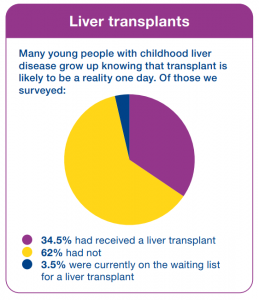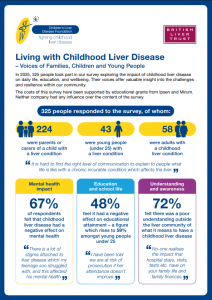A couple of months ago, we asked people who are affected by a childhood liver disease to tell us about their experiences. We’re incredibly grateful that many of you took the time to respond.
This survey has allowed us to hear directly from families, young people and adults living with childhood liver disease, helping us better understand both the challenges and the support that matters most.
We’d like to thank both Ipsen and Mirum Pharma for their educational grants, which made this survey possible; the companies had no input to the content of the survey.
Click here to view the full infographic.
Of the 325 people who responded to our survey:
- 224 were parents or carers of a child with a liver condition
- 43 were young people (under 25) with a liver condition
- 58 were adults (over 25) with a liver condition.
We heard from people with a wide variety of liver conditions, with the most (29% of respondents) being affected by biliary atresia while 2% remain undiagnosed. This diversity of voices has given us a powerful insight into the realities of living with childhood liver disease.
And of those who responded:
- 34.5% had received a liver transplant
- 62% had not
- 3.5% were currently on the transplant waiting list.

We wanted to build a picture in order to help shape our future services and the results were very interesting. Overall, throughout the UK, people were satisfied with the medical care they or their children were receiving and although there was a feeling that communication could sometimes be improved, the overall feedback is that medical professionals are doing their best.
Outside the hospital, however, families’ and young people’s experience is sadly less positive:
- 67% of respondents felt that childhood liver disease had a negative effect on mental health
- 48% felt that it had an adverse effect on educational attainment (this figure rose to 59% in the under 25 age group)
- 72% felt there was a poor understanding outside the liver community of what it means to have a childhood liver disease.
These findings highlight the emotional and social pressure many families face every day. Childhood liver disease does not just affect a child’s physical health, it can also impact their confidence, friendships, school life and their mental wellbeing.
We also wanted to know if people with a childhood liver disease have any additional health conditions and, interestingly, only 25% reported that they didn’t. While our infographic (link above) shows the number of confirmed diagnoses, many parents informed us that their child was currently undergoing investigations for an additional health condition.
We have long known that childhood liver disease affects every aspect of a young person’s life. These results only reinforce the importance of the emotional and practical support we provide and show that the need for this is greater than ever.
Support can mean many things, helping families navigate complex medical information, offering peer support, providing trusted guidance on daily challenges, and giving young people a space to share their experiences. Find out how we can support you and your child.
We are so grateful to everyone who took part in our survey. Over the next few months we will be scrutinising these results and working with parents and families to consider how we begin to address the issues and meet the needs you have raised.
